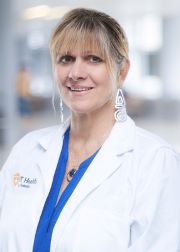Giselle Carnaby, PhD, MPH, professor in the Department of Health Sciences with cross-appointments in the Departments of Otolaryngology and Communication Sciences and Disorders in the School of Health Professions at The University of Texas Health Science Center at San Antonio, also known as UT Health San Antonio, is passionate about her research, which focuses on swallowing disorders (dysphagia), swallowing rehabilitation methods and survivorship.

Carnaby, who is also the director of the PhD in Health Sciences program at the institution, began her career as a speech-language pathologist. Her work naturally evolved to include research involving community work with elderly populations and those affected by neuromuscular diseases, stroke, and head and neck cancers.
“With my background in public health (biostatistics and epidemiology), I am fortunate to have been at the forefront in the development of numerous scales, tools and programs to measure, monitor and treat swallowing functions in these groups,” Carnaby said.
After years of field experience in her native Australia, where Carnaby was mentored by renowned neurologist and professor Graeme Hankey, MBBS, MD, as a fellow in a stroke research unit, she went on to conduct international stroke clinical trials as well as develop trials in neurology and head and neck cancers. In addition, she provided graduate, post-graduate and faculty research mentoring.
“It was during this time that I developed a passion for dysphagia and swallowing disorders research,” Carnaby said.
Since 1990, Carnaby has worked in health-related higher education and swallowing-related research, moving to the United States in 2000 to become a faculty member at the University of Florida College of Public Health and Health Professions and College of Medicine. In 2015, she joined the University of Central Florida where she was appointed as an eminent research scholar and tenured professor jointly in Communicative Sciences and Internal Medicine in the Department of Population Health.
Carnaby joined UT Health San Antonio in October 2021 for the opportunity to return to working directly with PhD students across various health fields and to continue her research within an R1 academic medical health science center.
“Many of my mentees have gone on to productive research careers, including the last three doctoral students who competed successfully for NIH-funded post-doctoral positions in centers specializing in alcohol abuse and oncology research,” Carnaby said. “I also continue actively mentoring junior faculty, formally and informally, and I hope to expand and develop my programmatic line of dysphagia research, which has not been offered previously at UT Health San Antonio.”

